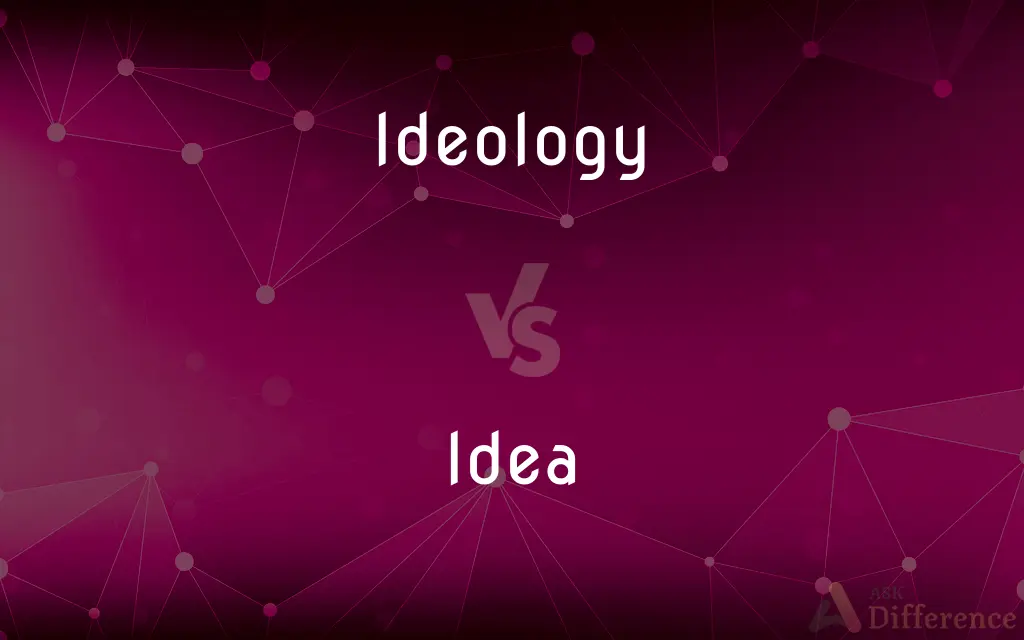Ideology vs. Idea — What's the Difference?
By Tayyaba Rehman & Fiza Rafique — Updated on April 6, 2024
Ideology encompasses a system of beliefs guiding political, economic, or social realms; an idea is a single concept, thought, or suggestion.

Difference Between Ideology and Idea
Table of Contents
ADVERTISEMENT
Key Differences
Ideology represents a cohesive set of beliefs or principles that shape the worldview of groups or individuals, often influencing political, economic, or social structures. Ideas, on the other hand, are individual concepts, thoughts, or suggestions that can be as simple as solving a small problem or as complex as forming the basis of an ideology.
Ideologies are typically more complex and structured, involving a series of ideas that collectively suggest how society should function or is organized. Ideas, whereas, can stand alone and do not necessarily need to be part of a larger framework or belief system.
An ideology often seeks to offer a broad explanation of how different elements of society interact, and it can motivate collective action towards a common goal. Ideas, however, may not have such grand ambitions and might be focused on specific, actionable items without broader societal implications.
Ideologies can significantly influence behavior and perceptions, shaping individuals' actions and reactions within a society. In contrast, an idea might influence an individual's behavior but doesn't inherently possess the power to shape societal norms or values.
While ideologies are usually deeply ingrained and can be difficult to change, ideas are more malleable and can evolve or be discarded more readily. This flexibility makes ideas less stable but more adaptable than ideologies.
ADVERTISEMENT
Comparison Chart
Definition
A system of beliefs or principles that guide actions and thoughts
A single concept, thought, or suggestion
Scope
Broad and comprehensive, affecting societal structures
Narrow, focusing on specific concepts or actions
Purpose
To offer a worldview and influence societal norms and structures
To provide a solution, enhance understanding, or inspire
Influence on Action
Can motivate collective action towards a common goal
Influences individual actions without broader societal impact
Stability
Typically ingrained and resistant to change
More adaptable and subject to change
Compare with Definitions
Ideology
Comprises a structured system of thought or belief.
Her ideology was built on a framework of philosophical and ethical principles.
Idea
A single, often innovative, concept or thought.
The idea to use solar panels on every house could revolutionize energy consumption.
Ideology
Pertains to a group or society's collective understanding and aspirations.
The movement's ideology emphasized equality and social justice for all.
Idea
While influential on a smaller scale, ideas may contribute to the development of ideologies.
The idea of sustainable living has slowly permeated many societies' ideologies.
Ideology
A comprehensive set of beliefs that shapes an individual's or group's worldview.
His ideology on environmental conservation motivated him to advocate for renewable energy sources.
Idea
Ideas are inherently flexible and subject to refinement or change.
The original idea evolved into a comprehensive plan after several brainstorming sessions.
Ideology
Though resistant, ideologies can evolve with societal changes.
His political ideology shifted significantly after witnessing the effects of climate change.
Idea
Concentrates on specific concepts or solutions without necessitating a broader belief system.
Her idea to organize a community garden brought neighbors together.
Ideology
Influences political, social, and economic behaviors and systems.
The party's ideology affected its stance on government intervention in the economy.
Idea
Can originate from and influence individual actions and decisions.
His idea to cycle to work inspired his colleagues to consider greener transportation modes.
Ideology
An ideology (/ˌʌɪdɪˈɒlədʒi/) is a set of beliefs or philosophies attributed to a person or group of persons, especially as held for reasons that are not purely epistemic, in which "practical elements are as prominent as theoretical ones." Formerly applied primarily to economic, political, or religious theories and policies, in a tradition going back to Karl Marx and Friedrich Engels, more recent use treats the term as mainly condemnatory.The term was coined by Antoine Destutt de Tracy, a French Enlightenment aristocrat and philosopher, who conceived it in 1796 as the "science of ideas" to develop a rational system of ideas to oppose the irrational impulses of the mob. In political science, the term is used in a descriptive sense to refer to political belief systems.
Idea
In common usage and in philosophy, ideas are abstract concepts. Also in philosophy, ideas can also be mental representational images of some object.
Ideology
A set of doctrines or beliefs that are shared by the members of a social group or that form the basis of a political, economic, or other system.
Idea
A thought or suggestion as to a possible course of action
Recently, the idea of linking pay to performance has caught on
It's a good idea to do some research before you go
Ideology
Doctrine, philosophy, body of beliefs or principles belonging to an individual or group.
A dictatorship bans things, that do not conform to its ideology, to secure its reign.
Idea
The aim or purpose
I took a job with the idea of getting some money together
Ideology
(uncountable) The study of the origin and nature of ideas.
Idea
(in Platonic thought) an eternally existing pattern of which individual things in any class are imperfect copies.
Ideology
The science of ideas.
Idea
Something, such as a thought or conception, that is the product of mental activity.
Ideology
A theory of the origin of ideas which derives them exclusively from sensation.
Idea
An opinion, conviction, or principle
Has some strange political ideas.
Ideology
A set or system of theories and beliefs held by an individual or group, especially about sociopolitical goals and methods to attain them; in common usage, ideology is such a set of beliefs so strongly held by their adherents as to cause them to ignore evidence against such beliefs, and thus fall into error - in this sense it is viewed as a negative trait; contrasted to pragmatism, and distinct from idealism.
Idea
A plan, purpose, or goal
She started school with the idea of becoming a doctor.
Ideology
An orientation that characterizes the thinking of a group or nation
Idea
The gist or significance
The idea of the article is that investing in green technology can save you money in the long run.
Ideology
Imaginary or visionary theorization
Idea
A sense that something can happen; a notion or expectation
They have this idea that we can just drop what we're doing and go to the park.
Idea
(Music) A theme or motif.
Idea
In the philosophy of Plato, a non-physical form or archetype to which beings in phenomenal reality correspond only as imperfect replicas.
Idea
In the philosophy of Kant, a concept of reason that is transcendent but nonempirical.
Idea
In the philosophy of Hegel, absolute truth; the complete and ultimate product of reason.
Idea
(Obsolete) A mental image of something remembered.
Idea
(philosophy) An abstract archetype of a given thing, compared to which real-life examples are seen as imperfect approximations; pure essence, as opposed to actual examples.
Idea
(obsolete) The conception of someone or something as representing a perfect example; an ideal.
Idea
(obsolete) The form or shape of something; a quintessential aspect or characteristic.
Idea
An image of an object that is formed in the mind or recalled by the memory.
The mere idea of you is enough to excite me.
Idea
More generally, any result of mental activity; a thought, a notion; a way of thinking.
Idea
A conception in the mind of something to be done; a plan for doing something, an intention.
I have an idea of how we might escape.
Idea
A purposeful aim or goal; intent
Yeah, that's the idea.
Idea
A vague or fanciful notion; a feeling or hunch; an impression.
He had the wild idea that if he leant forward a little, he might be able to touch the mountain-top.
Idea
(music) A musical theme or melodic subject.
Idea
The transcript, image, or picture of a visible object, that is formed by the mind; also, a similar image of any object whatever, whether sensible or spiritual.
Her sweet idea wandered through his thoughts.
Being the right idea of your fatherBoth in your form and nobleness of mind.
This representation or likeness of the object being transmitted from thence [the senses] to the imagination, and lodged there for the view and observation of the pure intellect, is aptly and properly called its idea.
Idea
A general notion, or a conception formed by generalization.
Alice had not the slightest idea what latitude was.
Idea
Hence: Any object apprehended, conceived, or thought of, by the mind; a notion, conception, or thought; the real object that is conceived or thought of.
Whatsoever the mind perceives in itself, or as the immediate object of perception, thought, or undersanding, that I call idea.
Idea
A belief, option, or doctrine; a characteristic or controlling principle; as, an essential idea; the idea of development.
That fellow seems to me to possess but one idea, and that is a wrong one.
What is now "idea" for us? How infinite the fall of this word, since the time where Milton sang of the Creator contemplating his newly-created world, -"how it showed . . . Answering his great idea," -to its present use, when this person "has an idea that the train has started," and the other "had no idea that the dinner would be so bad!"
Idea
A plan or purpose of action; intention; design.
I shortly afterwards set off for that capital, with an idea of undertaking while there the translation of the work.
Idea
A rational conception; the complete conception of an object when thought of in all its essential elements or constituents; the necessary metaphysical or constituent attributes and relations, when conceived in the abstract.
Idea
A fiction object or picture created by the imagination; the same when proposed as a pattern to be copied, or a standard to be reached; one of the archetypes or patterns of created things, conceived by the Platonists to have excited objectively from eternity in the mind of the Deity.
Thence to behold this new-created world,The addition of his empire, how it showedIn prospect from his throne, how good, how fair,Answering his great idea.
Idea
The content of cognition; the main thing you are thinking about;
It was not a good idea
The thought never entered my mind
Idea
A personal view;
He has an idea that we don't like him
Idea
An approximate calculation of quantity or degree or worth;
An estimate of what it would cost
A rough idea how long it would take
Idea
Your intention; what you intend to do;
He had in mind to see his old teacher
The idea of the game is to capture all the pieces
Idea
(music) melodic subject of a musical composition;
The theme is announced in the first measures
The accompanist picked up the idea and elaborated it
Common Curiosities
Why are ideologies important?
Ideologies are important because they shape societal norms, values, and structures, influencing how individuals and groups interact within a society.
How does an idea differ from an ideology?
An idea is a single thought or suggestion, while an ideology is a cohesive set of beliefs guiding broader social, economic, or political structures.
Can ideas influence ideologies?
Ideas can influence ideologies by introducing new concepts or perspectives that may be adopted into the broader belief system.
Can an idea become part of an ideology?
Yes, individual ideas can contribute to or become integrated within an ideology if they align with its broader principles and beliefs.
Are ideologies always political?
While ideologies often influence political systems, they can also pertain to economic, social, and cultural aspects of society.
How do ideologies influence individual behavior?
Ideologies can dictate moral values, priorities, and actions, guiding individuals in making decisions that align with their belief system.
How are new ideas generated?
New ideas are often generated through creative thinking, problem-solving, and the synthesis of existing concepts in novel ways.
What role do ideas play in societal change?
Ideas can spark innovation, inspire action, and lead to societal changes when they address needs or aspirations of a community.
How do ideologies develop?
Ideologies develop through historical, cultural, social, and personal influences, evolving as they interact with changing societal norms and values.
What is an ideology?
An ideology is a system of beliefs or principles that influences the way individuals or groups view the world and guide their actions within it.
Is it possible for an individual to have no ideology?
While it's difficult for an individual to completely lack any form of belief system, people may not always identify with a specific or formal ideology.
Can an ideology change over time?
Yes, ideologies can evolve in response to new information, societal shifts, or the emergence of new ideas.
Share Your Discovery

Previous Comparison
Evangelical vs. Protestant
Next Comparison
Piston vs. SyringeAuthor Spotlight
Written by
Tayyaba RehmanTayyaba Rehman is a distinguished writer, currently serving as a primary contributor to askdifference.com. As a researcher in semantics and etymology, Tayyaba's passion for the complexity of languages and their distinctions has found a perfect home on the platform. Tayyaba delves into the intricacies of language, distinguishing between commonly confused words and phrases, thereby providing clarity for readers worldwide.
Co-written by
Fiza RafiqueFiza Rafique is a skilled content writer at AskDifference.com, where she meticulously refines and enhances written pieces. Drawing from her vast editorial expertise, Fiza ensures clarity, accuracy, and precision in every article. Passionate about language, she continually seeks to elevate the quality of content for readers worldwide.













































